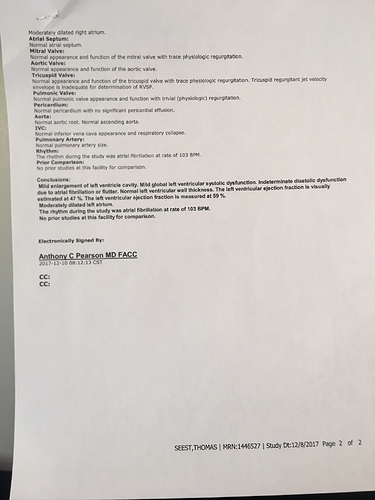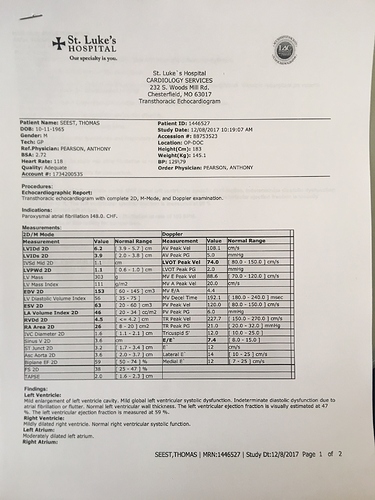For those of you that don’t know my story, I used to be a very large man. While I don’t know my exact weight, I know that I lost a significant portion of weight until I dropped below 500 pounds and could weigh. You can hear more about my weight lost story on this podcast, if you’re really bored: http://2ketodudes.com/show.aspx?episode=14
In December of last year, I managed to get pneumonia, and it subsequently managed to damage my heart and give me Atrial Fibrillation with Rapid Ventricular Response. I managed, through diet and fasting to reverse the damage that the pneumonia did to my heart, but managed to end up with a Congestive Heart Failure diagnosis in September, to go along with the Atrial Fibrillation with Rapid Ventricular Response. You can hear more about that story, in this interview for this episode of the same podcast: http://2ketodudes.com/show.aspx?episode=88
The primary blood test that people with Congestive Heart Failure monitors call BNP, which tells us some things about how the heart is doing. B-type natriuretic peptide (BNP) is a small protein secreted by the ventricles of the heart in response to excessive stretching of the heart muscles cells (myocytes). BNP is secreted into the blood when your heart is working hard.
The level of BNP is elevated in people with heart failure and left ventricular dysfunction. B-type natriuretic peptide blood levels correlate with both the severity of symptoms and the prognosis in congestive heart failure.
This blood test is a useful marker of heart disease risk, even in people with no clinical evidence of cardiovascular disease. High blood levels of BNP predict the risk for heart failure, first cardiovascular events, atrial fibrillation, and stroke.
When I received my heart failure diagnosis in September, my BNP level was 409 (0 to 100 is considered normal). However, through dieting and fasting, I felt like I was getting better.
I recently completed a 6 day water fast with the intention of studying the effects of fasting on BNP, since it is a marker of inflammation similar to Insulin. I had reading done for my BNP, CRP, a Complete Blood Count, and an NMR profile done the day before I began my fast. I then had my BNP, CRP, and CBC taken throughout the fast, and then I had the BNP, CRP, CBC and NMR taken right before I ended the fast on the 6th day. I also had taken my Blood Glucose and Blood Ketone levels measured throughout the fast, along with Blood Pressure and heart rate which I monitor almost 24X7. I also monitor my Heart Rate Variability every day. I entered all of this information, including the results of the blood tests in this spreadsheet:
https://1drv.ms/x/s!AnnheiLCcfWxgcE0qf2dNsbEiD0ysQ
The bottom line is that my BNP went from 141 (low for someone with my conditions) slightly up on the 2nd day of fasting up to 170, and then it went down to 72 on the last day of the fast, which is considered normal. To me; this is completely remarkable. I hope to have time to repeat this test in another week or two, depending on the treatment strategy of my cardiologist. I had an echo cardiogram done today, and he may elect to treat me before I can repeat the experiment.
I’ll be happy to answer any questions that any of you may have, regarding my protocol, etc.


